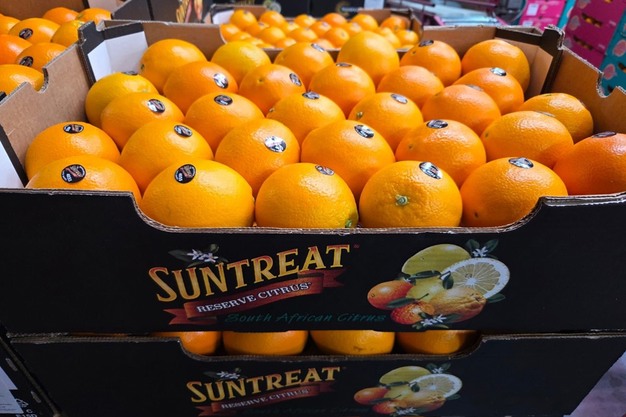JWM Asia's citrus procurement from South Africa is nearing its end. The last fruit to China is on the water; the late mandarins, late navels, and Valencias for Mid-Autumn Festival sales will arrive next week. JWMAsia's final citrus shipments from South Africa will take late navels to Hong Kong.
The Chinese lemon crop was lower, creating a shortage (and it might be the case again next year), which resulted in South African lemons obtaining strong prices.
Lower volumes of South African soft citrus were sent to China compared to last year: Chinese consumers have less disposable income and sales are slower, says Dennis Pretorius, who heads up JWMAsia's procurement team in South Africa, and until the end of August, "there'd been no fireworks. Now the market is picking up somewhat, and we're hoping for better citrus sales in the runup to the Mid-Autumn festival." © JWMAsia
© JWMAsia
South African late navels like Witkrans and Cambria are premium varieties
Pretorius observes a shift in the requirements from their Chinese clients, from purely cosmetic considerations to a more balanced combination of that plus eating quality. "And another trend we've picked up is a difference of 20 to 30 RMB between top quality and average quality fruit. It makes a big difference to the bottom line back in South Africa."
South African varieties like Witkrans and Cambria, both late navels, are regarded as premium varieties, while Midknights remain the preferred Valencias. This granular varietal distinction is a hallmark of the South African citrus trade.
China has become primarily a processing grade market for grapefruit, with barely any less cosmetic class 1 grapefruit placed there this year. "The grapefruit trade was stable at the start and towards the end of the season, it started picking up steam when processing factories realized that they didn't have enough grapefruit." But by that time, he remarks, the volumes were mostly finished.
Australian citrus enlarges footprint
"Australia competes head-on with us. Over the past two years in Hong Kong, one could see that their footprint has enlarged. Before, Australia used to focus on the higher-paying markets like Vietnam, Japan, or Korea, but we're seeing more Australian products in Hong Kong. And another thing we noticed was that they sent some of the fruit in bins to China."
Australian fruit enters China under a free trade agreement, while South Africa's oranges have an 11% duty and its soft citrus an 12% duty. No steri protocol is imposed on Australian fruit, boosted by a shorter voyage compared to South African fruit.
 © JWMAsia South African Midknight Valencias packed into JWMAsia's Joytree brand
© JWMAsia South African Midknight Valencias packed into JWMAsia's Joytree brand
JWM Asia also procures apples and pears from Grabouw and Ceres farms for Vietnamese and Singaporean retail. The latter is the main buyer of their South African-grown blueberries (plus a bit to Hong Kong), but Peru is a difficult competitor when their berries are in the market.
South African stonefruit's access to China is the subject of current bilateral negotiations, and JWMAsia is considering the opportunities that would exist for South Africa in that market where other Southern Hemisphere roleplayers are already present.
For more information: Dennis Pretorius
Dennis Pretorius
JWMAsia South Africa
Tel: +27 21 000 5120
Email: [email protected]
https://jwmasia.com/
